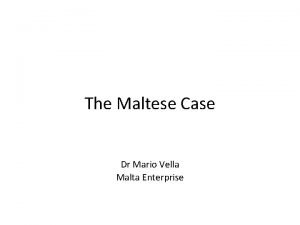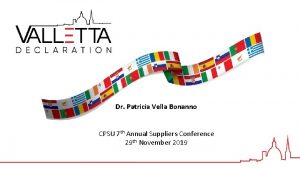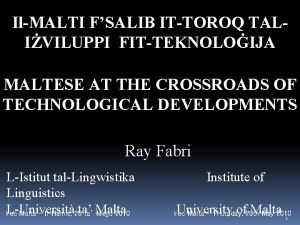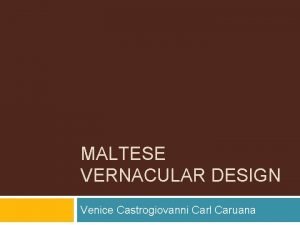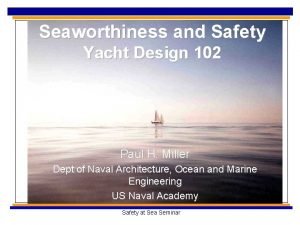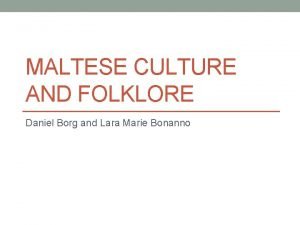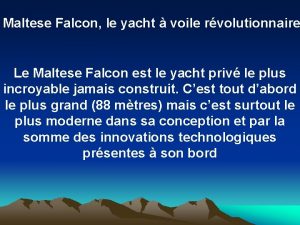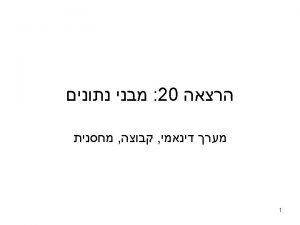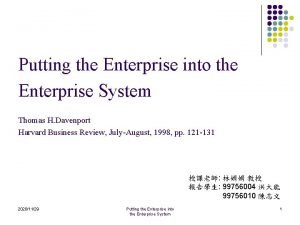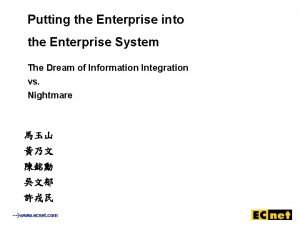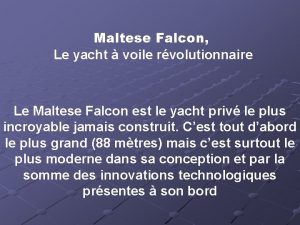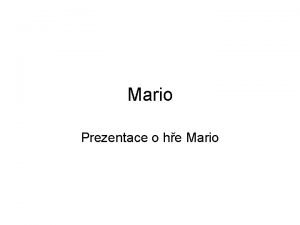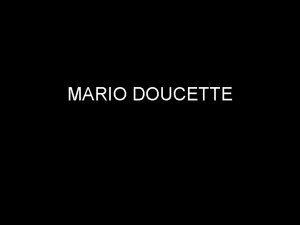The Maltese Case Dr Mario Vella Malta Enterprise















- Slides: 15

The Maltese Case Dr Mario Vella Malta Enterprise

Fisheries and Aquaculture in Malta • The fishing industry in Malta is relatively small, but its social significance by far outweighs its economic importance. – Caters mainly for local consumption (Maltese & tourists) • In 1971, Malta declared an Exclusive Fishing Zone (EFZ) that extended to 25 nautical miles from the baselines of the Maltese Islands • With the entry of Malta into the European Union in 2004, this zone was maintained as a Fisheries Management Zone (FMZ) around the Maltese Islands by EU Council Regulation • The aquaculture industry in Malta started in the late eighties catering mostly for export – Contribution to GVA € 8. 3 million (2013)

Fishing & Aquaculture • Exports of Fish and Crustaceans: – 2014: € 97. 5 million (of which 85% Tuna) – 2014: (Jan-Oct): € 30. 1 million – 2015: (Jan-Oct): € 48. 9 million • Gross Value Added – 2013: € 17. 7 million (0. 27% of total GVA) – 2014: € 27. 5 million (0. 40% of total GVA) • Full time employment: – 555 full timers and 644 part timers (July 2015) – 528 full timers and 650 part timers (July 2014) – 0. 32% of all full time employment and 1. 06% of all part time employment (July 2015)

Contribution to Employment and GVA Sector Employment Gross Value Added 2010 2012 2014 (%) (%) (%) Fisheries & 0. 4 Aquaculture Manufacturing 13. 5 ICT 3. 3 Financial and 5. 5 Insurance Wholesale & 15. 2 retail trade Source: Eurostat 0. 4 0. 4 12. 7 3. 5 12. 0 3. 7 12. 9 5. 5 12. 5 6. 0 10. 0 5. 9 5. 6 5. 4 7. 8 8. 2 7. 2 15. 3 15. 4 10. 7 11. 3 11. 1

Contribution to Exports Commodity 2011 2012 2013 2014 1. 5% 1. 8% 2. 6% 5. 5% 5. 8% 6. 7% Mineral fuels, oils & products 42. 4% 40. 8% 42. 4% 43. 2% Electrical machinery 26. 5% 23. 6% 23. 9% 20. 9% Fish and crustaceans, etc. Pharmaceutical products Source: National Statistics Office

Exports (€ million) Commodity 2011 2012 2013 2014 Fish & € 55. 7 € 80. 9 € 102. 6 € 97. 5 crustaceans, etc. Pharmaceutical € 209. 3 € 256. 1 € 261. 7 € 248. 2 products Mineral fuels, oils € 1, 620. 7 € 1, 812. 0 € 1, 664. 8 € 1, 607. 1 & products Electrical € 1, 011. 4 € 1, 046. 4 € 936. 7 € 778. 9 machinery Other Total € 921. 9 € 1, 243. 4 € 959. 6 € 987. 0 € 3, 819. 0 € 4, 438. 8 € 3, 925. 4 € 3, 718. 7 Source: National Statistics Office

Sales of Fish (2013) € 11 10% Tuna Source: NSO € million € 2 2% Sea Bream € 93 88% Other

Socio-Economic Contribution • The industry generally does not demand high education achievers. Although it does employ few knowledge workers in R&D and managerial roles. Employment by Category 86 7% 1, 190 93% Professional Source: ETC skilled/elementary

Fishing Vessels by Length (2013) 95 3% 60; 2% 1, 308 44% 1, 489 50% <5 5 - <10 10 - <15 ≥ 15 Source: NSO • The average of the Maltese fleet is old, circa 22. 5 years. • Nearly all our vessels are less than 10 metres.

GVA per Employee – Fishing & Aquaculture € 55, 000 € 50, 000 € 45, 000 € 40, 000 € 35, 000 € 30, 000 € 25, 000 € 20, 000 € 15, 000 € 10, 000 € 5, 000 € 0 2005 2006 2007 2008 2009 2010 2011 2012 2013 2014 EU 28 Source: Eurostat EA 19 Malta

0. 43% 0. 30% 2011 0. 37% 0. 44% 0. 32% 0. 44% 0. 33% 0. 41% 0. 27% 0. 32% 0. 36% 0. 48% 0. 45% 2010 0. 15% 2005 Source: Eurostat • 0. 29% 0. 26% 0. 50% 0. 45% 0. 40% 0. 35% 0. 30% 0. 25% 0. 20% 0. 15% 0. 10% 0. 05% 0. 00% 0. 39% Fishing & Aquaculture-Malta’s share in EU 28. . . 2006 2007 2008 GVA 2009 2012 2013 Employment For Fishing & Aquaculture, Malta’s share in the total EU 28: – Employment has remained stable between 2011 and 2013, – GVA has declined compared to 2007, but remained relatively stable (2010 -2013)

Competitiveness • Competitiveness relates to the extent that firms are able to compete successfully in the regional and global economy, advancing wages and living standards. • Competitiveness depends on efficiency of the location as a place to do business, increasing productivity and as well as achieving active participation of the workforce.

Factors Affecting Competitiveness: The Fisheries Competitiveness Index factors include macro-economic factors and micro-economic factors Macro-Economic Factors Micro-Economic Factors Fishing Companies Fisheries Management (Ex: competencies, competition & (Ex: property rights & freedom of cooperation between fishing exchange of fishing rights) companies and suppliers) Marco-economic management Fish processing companies & government (Ex: Impact of Government on (Ex: labour law & regulations, taxes) fishing companies) Infrastructure & Environment (Ex: education & knowledge, general infrastructure) Marketing (Ex: competencies of marketing companies/exporters as well as competition and interaction with suppliers)

Issues: Fisheries only • Deteriorating infrastructure • Lack of investment (renewing present fleet, technology and size) • Low priced imported fish • Declining availability of popular species

Way Forward • Need to promote environmentally sustainable, resource efficient, innovative, competitive and knowledge-based fisheries and aquaculture. These will contribute to long run productivity of the sector; hence increased competitiveness. • Fisheries in Malta is a small sector within a tiny country and the short term socio-economic implications and impacts of fisheries management need to be evaluated in the design and implementation. • Communicating to industry how fisheries management measures encourage the sector’s sustainability with positive implications for growth and further development of the sector. • Fisheries & aquaculture R&D. Malta Enterprise contribution through Life Sciences Park genomics projects and possible cooperation with Malta Aquaculture Research Centre.
 Mario vella malta
Mario vella malta Patricia vella
Patricia vella Vella motors
Vella motors Darren vella
Darren vella Maltese spell check microsoft word
Maltese spell check microsoft word Maltese christmas traditions
Maltese christmas traditions Carl maltese
Carl maltese Maltese falcon yacht collision
Maltese falcon yacht collision Tunnara
Tunnara Lionel maltese
Lionel maltese Lionelmaltese.fr
Lionelmaltese.fr Bateau faucon maltais
Bateau faucon maltais Nnnnnp
Nnnnnp Best case worst case average case
Best case worst case average case Enterprise
Enterprise Putting the enterprise into the enterprise system
Putting the enterprise into the enterprise system
